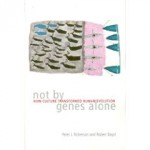
Both Wright and these authors acknowledge Richard Dawkins and The Selfish Gene: 30th Anniversary Edition–with a new Introduction by the Author as being instrumental in getting the academy to think new thoughts.
However, and despite other's averaging a four, I feel such a sense of respect for what these two authors have done (with a superb bilbiography and a good index) that I cannot qualify this with less than five stars.
The two nuggets for me, with my interest in Epoch B leadership and self-organizing communities, came at the end:
+ Hierarchies are inefficient attempts to segment levels of society so as to reduce the distances between segments to tolerable ones, while actually creating a MASSIVE gap between the top and the bottom.
+ “Our knowledge of the basic cultural patterns of evolution is grossly incomplete…”
Here are my fly-leaf notes, a short summary of the book–a number are also segment headings in the book, a matter of choice on my part.
+ Culture is CRUCIAL for understanding human behavior both individually and in aggregate groups
+ Populations carry a variable pool of inherited information thorugh time–population units provide the unit of linkage between cultural evolution and genetic evolution
QUOTE: “Culture is information capable of affecting individuals' behavior that they acquire from other members of their species through teaching, imitation, and other forms of social transmission.”
+ Culture changes nature of human evolution and is necessary part of the design problem for human psychology
+ Feedback loops between human psychology, social information, and environment [this is a special interest of mine, data pathologies and information asymmetries retard the achievement of universal propserity and peace–see Earth Intelligence Network's book Collective Intelligence: Creating a Prosperous World at Peace.
+ Culture an ultimate cause of human behavior, distinguishing humans from all other species as humans have both advanced technologies and advanced social systems
+ The authors strive to follow Darwin's “path not followed” but are pointed in noting that Darwin himself identified the path in his original work
+ Culture is NOT divorced from biology
+ Cultural difference account for much human variation (including memorably, difference tastes with respect to horse meat)
+ Technology is culture, not part of the environment [this is of special interest to me as a proponent for Open Source Intelligence (OSINT) and Multinational, Multiagency, Multidisciplinary, Multidomain Information-Sharing and Sense-Making (M4IS2) because the USA treats OSINT as a technical collection discipline rather than a human intelligence/cultural understanding issue, which is flat out WRONG and a major cause of US ignorance about all matters foreign to it's internal biases]
+ Social environment is NOT culture and culture is NOT the social environment
+ Culture is (mostly) information in brains, gestated by biased and unbiased transmissions as well as observation and immitation
+ Adaptive biases and maladaptive cultures merit much more study; if information costs are high maladaptive beliefs will spread
+ One example of a maladaptive culture is that of the consumer culture that redirects time and energy from offspring to consumption
+ Culture allows rapid adaptation to a wide range of environemnts but leads to systematic maladaptations as a result
+ Some cultural sub-sets (e.g. the Amish) can avoid assimilation
+ Genes and culture co-evolve
+ Commmand backed up by force is NOT sufficient to keep a population submissive–culture plays a huge role in pressing conformity to the point that force is only needed for the resistant few
The authors end with some observations on the need for a great deal more data, observing that most studies to this point, few that they have been, have been qualitative in nature. My own view is that we will never intermediate data about the real world–we have to create a World Brain with an embedded EarthGame that can connect all humans with all information–and especially true cost information about every product and service–so that we can all play ourselves and finally achieve Point Omega (Pierre Teilhard de Chardin).
Major book forthcoming soon: Tom Atlee's Reflections on Evolutionary Activism. A pre-review is available at Phi Beta Iota, the Public Intelligence Blog.
Other books I recommend within my ten link limit:
Integral Consciousness and the Future of Evolution
Conscious Evolution: Awakening Our Social Potential
How to Change the World: Social Entrepreneurs and the Power of New Ideas, Updated Edition
Society's Breakthrough!: Releasing Essential Wisdom and Virtue in All the People
The Cultural Creatives: How 50 Million People Are Changing the World
The Leadership of Civilization Building: Administrative and civilization theory, Symbolic Dialogue, and Citizen Skills for the 21st Century




